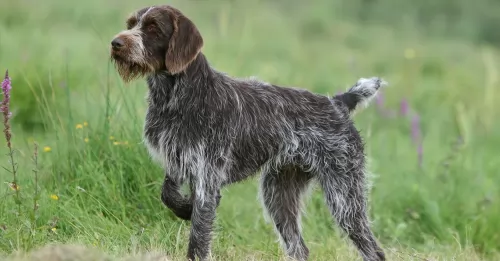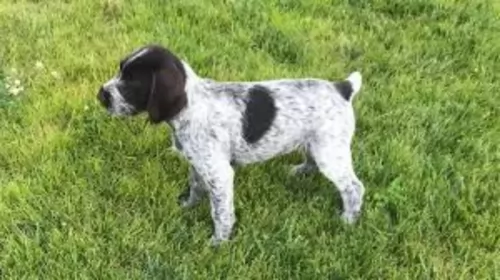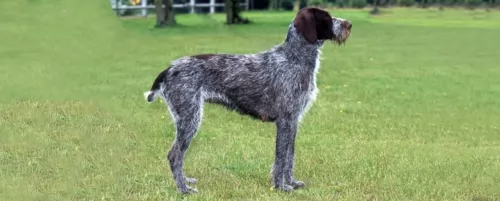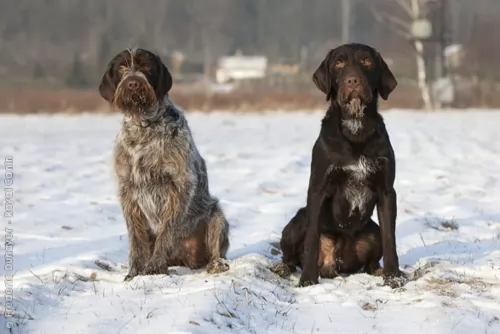 Petzlover
Petzlover Cesky Fousek is originated from Czech Republic but Sage Koochee is originated from Afghanistan. Cesky Fousek may grow 23 cm / 9 inches shorter than Sage Koochee. Cesky Fousek may weigh 52 kg / 114 pounds lesser than Sage Koochee. Both Cesky Fousek and Sage Koochee has almost same life span. Both Cesky Fousek and Sage Koochee has almost same litter size. Both Cesky Fousek and Sage Koochee requires Low Maintenance.
Cesky Fousek is originated from Czech Republic but Sage Koochee is originated from Afghanistan. Cesky Fousek may grow 23 cm / 9 inches shorter than Sage Koochee. Cesky Fousek may weigh 52 kg / 114 pounds lesser than Sage Koochee. Both Cesky Fousek and Sage Koochee has almost same life span. Both Cesky Fousek and Sage Koochee has almost same litter size. Both Cesky Fousek and Sage Koochee requires Low Maintenance.
 The Cesky Fousek is also known as the Bohemian Wire-Haired Pointing Griffon and he hails from the Czech Republic. The name ‘Fousek’ is referring to the dogs facial hair.
The Cesky Fousek is also known as the Bohemian Wire-Haired Pointing Griffon and he hails from the Czech Republic. The name ‘Fousek’ is referring to the dogs facial hair.
With World War 1, the dog all but disappeared, but with careful breeding, its numbers have built up. Today the dog is a popular hunting breed in its home country. In 1957 and 1958, Czechoslovakia joined the Federation Cynologique Internationale, and this is when a new breed standard was written and approved. In 1964, the dog breed was recognized by the FCI and by the United Kennel Club in 1996.
The Cesky Fousek has even been represented on postage stamps issued in the country in 1965, and again in 1973. Today, the breed is as popular as ever in the Czech Republic as well as other countries where there are breeding programs.
 Known also as the Kuchi Dog, the Sage Koochee is a dog that was bred more for his characteristics than his looks. He was bred to be a protector and guardian and named after the Afghan Kochi people.
Known also as the Kuchi Dog, the Sage Koochee is a dog that was bred more for his characteristics than his looks. He was bred to be a protector and guardian and named after the Afghan Kochi people.
Referred to as the Kuchi or Sage Kuchi, this working dog has always helped nomads with guarding their caravans and livestock. The dog has genetic resemblance with the Central Asian Ovcharka but isn’t recognized as an official breed by any of the major kennel clubs.
 The Cesky Fousek is a medium sized dog with both the male and the female standing between 58 – 66cm and weighing 22–28kg. The dog has a fairly distinctive appearance, looking quite a bit like a German Wire-haired Pointer, but he has the mustache and beard which the Pointer doesn’t have.
The Cesky Fousek is a medium sized dog with both the male and the female standing between 58 – 66cm and weighing 22–28kg. The dog has a fairly distinctive appearance, looking quite a bit like a German Wire-haired Pointer, but he has the mustache and beard which the Pointer doesn’t have.
The tail of this dog is carried horizontally and is generally docked to 3/5 of its natural length to give the dog a distinctive look. These days, with regulations around docking, the tail is left long. The ears are floppy and rounded at the tips and the eyes are brown.
The dog’s coat is short to medium length and fairly coarse with colors being dark roan or brown with ticked markings.
The Cesky Fousek is an energetic, eager-to-please dog and he just loves playing with the children in the home. He is an intelligent dog who is loyal, social and protective and you’ll find that he is easy to train. In fact, with socialization and training, he becomes obedient and amicable around adults, children and other pets.
 The Sage Koochee is a large molosser dog, although they do vary quite a bit in height. This is because they generally come in 3 varieties.
The Sage Koochee is a large molosser dog, although they do vary quite a bit in height. This is because they generally come in 3 varieties.
They can stand at between 58 to 89cm in height and they weigh between 38 to 80kg. This is because this dog is divided into 3 types. The coat of this dog can be short, medium or long, and colors can vary quite a bit as well.
These are moderate, seasonal shedders. Their tails are usually docked to about 1/3 of their length and their ears have been traditionally docked too. They are very territorial and won’t show any tolerance to strangers coming onto the property. He also tends to be aggressive towards other dogs.
These dogs are tough and fierce and also immensely intelligent. Such a dog would have to be trained and socialized or you would land yourself with a strong-willed, disobedient dog.
Once they’ve had training, they are friendly, obedient and affectionate towards their owners, but aren't a good choice for children. They are extremely territorial and make good watchdogs,being prepared to fiercely protect their human family.
The very nature of this dog makes it not suitable for life in the city. It would be terribly frustrated in small spaces and can become aggressive.
 The Cesky Fousek is a fun loving, good natured dog who is always up for a game. This is why he isn’t a dog that will fit into an apartment or shoe-box size garden.
The Cesky Fousek is a fun loving, good natured dog who is always up for a game. This is why he isn’t a dog that will fit into an apartment or shoe-box size garden.
Socialize and train him and he becomes a wonderful family pet, good around children and other pets. He loves human companionship and isn’t a dog to be left outside to run around on his own.
The Cesky Fousek is easy to train, and when he is treated properly and made to feel an important member of the family, he provides you with his unconditional love and friendship.
 The Kuchi has always been vigilant with guarding livestock, and these tough dogs did the job of guardian and protector extremely well.
The Kuchi has always been vigilant with guarding livestock, and these tough dogs did the job of guardian and protector extremely well.
They’re hardy too, used to coping with extreme weather conditions, from hot deserts to freezing mountain areas. These dogs are powerful and independent and they are also dangerous.
With good training and socialization they can become loving and loyal, but they require a strong, firm owner, and don’t come as recommended if there are children in the home.
 The average lifespan of this dog breed is about 12 to 15 years, and even though he is a robust breed, some common health issues do exist.
The average lifespan of this dog breed is about 12 to 15 years, and even though he is a robust breed, some common health issues do exist.
Certainly if you’re considering breeding for your Cesky Fousek, you’ll want to have him tested for dysplasia, eye problems and Von Willebrands Disease.
Von Willebrands Disease is an inherited bleeding disorder, caused by a deficiency in the amount of a specific protein needed to help platelets.Often the dog doesn’t show outward evidence of having the disease while other dogs might even hemorrhage from the nose or elsewhere.
 The Kuchi breed is healthy and doesn’t have any particular health issues. Things to look out for are bloat, skin allergies, cancer and parasites.
The Kuchi breed is healthy and doesn’t have any particular health issues. Things to look out for are bloat, skin allergies, cancer and parasites.
Parasites are a common in many dogs. Fleas and ticks are external parasites, but intestinal parasites can be a real nuisance too and endanger your dog’s health.
These parasites live within the dog’s gastrointestinal tract. They can be a host of terrible worms such as roundworm, hookworms and tapeworm among others. The parasites are usually transmitted when the dog ingests contaminated food, soil or even feces.
These parasites can cause endless problems for the dog, from weight loss to diarrhea to vomiting. You will need to get your pet to the vet.
 The coat of the Cesky Fousek is easy to maintain and you’ll want to brush him at least twice a week with a firm bristle brush to get through the coarse hair and rid him of loose hairs.
The coat of the Cesky Fousek is easy to maintain and you’ll want to brush him at least twice a week with a firm bristle brush to get through the coarse hair and rid him of loose hairs.
Ear infections are common in dogs, but dogs with floppy ears are more susceptible to ear infections than dogs with erect ears. The infection often starts in the external ear canal and occurs when excess bacteria grows in the ear canal and it becomes inflamed.
Always take your pet to the veterinarian at the first sign of an ear infection. You’ll notice your pet shaking his head and the ear may well be red and inflamed. Your vet will discuss the proper treatment and suggest ways to prevent recurrence. The vet may also recommend an ear cleaning solution as well.
This dog breed needs plenty of exercise and he’ll love his daily walks with you. Put him on a leash and allow him to run with you when you go cycling or jogging.
This is a very active dog used to hunting and he’ll require good quality protein. Speak to your vet about how many calories your dog will need each day, more so if you have a puppy and are unsure in terms of his growth.
He is a medium-to-large breed so you’ll want a food that caters for his size, his age and his energy. Include portions of rice, vegetable and meat into his kibble from time to time for variety, and never forget to include some raw meat into his diet.
Fresh, cool water is of critical importance and should be available night and day.
 A nutritious commercially manufactured dog food for large working dogs will be required for this strong, energetic dog. You want to provide it with some variety, so some homemade food added into the dry kibble twice a week will ensure he is healthy and content.
A nutritious commercially manufactured dog food for large working dogs will be required for this strong, energetic dog. You want to provide it with some variety, so some homemade food added into the dry kibble twice a week will ensure he is healthy and content.
Home-made food such as boiled chicken, brown rice or pasta and spinach, sweet potatoes and carrots all boiled slowly together will delight your pet. You just chop it up and add it to the dry kibble twice a week and your pet will never look back.
For his skin and coat, you can try to add in a little bit of raw meat occasionally.Dogs thrive on simple, consistent meals like this – nothing weird and spicy so as to avoid stomach upsets.
Groom your Kuchi dog by brushing him twice a week and check simultaneously for any lumps you may find on him.
Trim his nails.
Check his eyes and make sure they are clear with no signs of discharge.
Check inside the mouth for rotten or bad teeth as he can’t tell you if one is rotten and causing him tremendous pain and discomfort.
Make sure his vaccines are up to date to avoid life threatening canine diseases.
Provide him with a nice, warm dry place to sleep.
Make sure he has access to shade and sun when he’s outdoors.
Have him or her spayed or neutered to avoid puppies